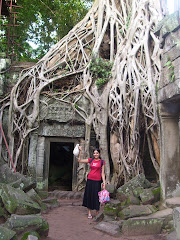Since the
declaration of Coronavirus (Covid 19) pandemic, I have been mostly working from
home. Since a majority of my work is done on my laptop, it somehow did not feel
all that different. But stray thoughts kept coming to me. Fears for personal
safety and safety of family members with health conditions. I call them
compulsively to make sure they are following precautions. I worry about
handwash, soaps, sanitizers, and medicines disappearing from the shops. I
compulsively refresh the Facebook feed, where I follow a host of news outlets who
keep updating the latest information- facts and figures from all over the world.
These numbers are slowly and surely creeping up close to my geographical
location and those of my loved ones. Insidiously it seems. And endless
WhatsApp forwarded messages- some fake and some true.
I often
think wistfully about past travel experiences now. My husband and I love
traveling to new places each year mostly within India and re-visit some
favorite ones throughout the year. I fear that travel will be
severely restricted in future.
It is one
of those activities that fill me with so much pleasure and joy that it is
physically suffocating to think that it may be curtailed significantly in the
near future. I did realize that I was extremely lucky to plan and travel for
the past several years. I never took it for granted even then. Even the most
seemingly mundane trip within the same town or city has excited me since
forever it seems. Does it have to do something with the itinerant part of my
early childhood in an army family, traversing the Indian subcontinent in the
swaying trains...sleeping on the top berth, hearing the coolies and vendors at
night time...and surreptitiously eavesdropping on a neighbor's conversations
before ultimately befriending the entire family...every one sitting close to
each other.
I wonder
how India can manage social distancing where people often live and work closely-
cheek to jowl; where almost everything can be easily experienced, except
solitude. Some people show the usual fatalistic attitude by saying, 'what has
to happen will happen'. Others rush to scold them to say that they are
endangering others.
Another
scene - Arriving in Bidar Fort (north Karnataka) near sunset and racing to see
the wide expanse of it and engaging in some brilliant photography and
then to a nearby Sufi shrine, where women are not allowed to enter but huddle
together in black robes outside at the door praying fervently, as men enter
with insouciance.
All the
irritations experienced in these trips seem so rosy now. The painful throat
infection at the end of the Rajasthan trip; the arguments with the driver; the
extreme chill in the air as we trudge up the steep hills in Shimla on a
December day (this was part pleasure and part pain).
There are
a lot of immediate worries related to the pandemic, but this curtailing of
future travel seems claustrophobic and evokes in me sadness and a loss of
control. I assuage my fears by watching travel documentaries on the TV. Seeing
elephants at Jim Corbett Park on a TV channel yesterday buoyed my spirits
briefly.
The
aftermath of this pandemic may be catastrophic for the economy with no room or budget
to plan for traveling. But I will continue to hope and plan the next one at
least in my mind to begin with. However, hackneyed it may sound, the current
state of affairs will make the already-so-gorgeous activity of traveling in
future even more delightful. So delightful that the heart can barely contain
itself.
I think
about these things with some guilt. It also feels frivolous as the more
immediate need is to ensure that people are not affected by the virus and
things can go back to normal or what was normal earlier. But when will that
happen? Uncertainty prevails.











